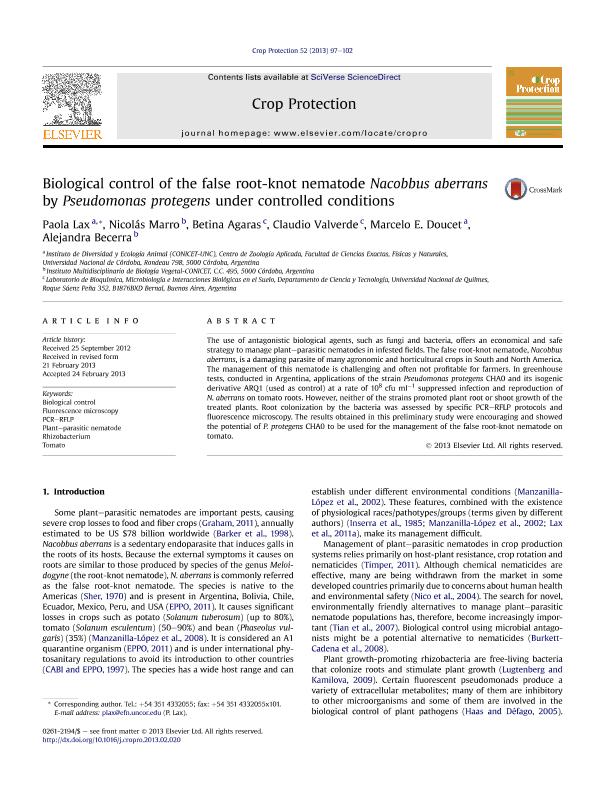Mostrar el registro sencillo del ítem
dc.contributor.author
Lax, Paola

dc.contributor.author
Marro, Nicolás Alejandro

dc.contributor.author
Agaras, Betina Cecilia

dc.contributor.author
Valverde, Claudio Fabián

dc.contributor.author
Doucet, Marcelo Edmundo

dc.contributor.author
Becerra, Alejandra Gabriela

dc.date.available
2016-11-16T21:17:52Z
dc.date.issued
2013-06
dc.identifier.citation
Lax, Paola; Marro, Nicolás Alejandro; Agaras, Betina Cecilia; Valverde, Claudio Fabián; Doucet, Marcelo Edmundo; et al.; Biological control of the false root-knot nematode Nacobbus aberrans by Pseudomonas protegens under controlled conditions; Elsevier; Crop Protection; 52; 6-2013; 97-102
dc.identifier.issn
0261-2194
dc.identifier.uri
http://hdl.handle.net/11336/8274
dc.description.abstract
The use of antagonistic biological agents, such as fungi and bacteria, offers an economical and safe strategy to manage planteparasitic nematodes in infested fields. The false root-knot nematode, Nacobbus aberrans, is a damaging parasite of many agronomic and horticultural crops in South and North America. The management of this nematode is challenging and often not profitable for farmers. In greenhouse tests, conducted in Argentina, applications of the strain Pseudomonas protegens CHA0 and its isogenic derivative ARQ1 (used as control) at a rate of 108 cfu ml1 suppressed infection and reproduction of N. aberrans on tomato roots. However, neither of the strains promoted plant root or shoot growth of the treated plants. Root colonization by the bacteria was assessed by specific PCR-RFLP protocols and fluorescence microscopy. The results obtained in this preliminary study were encouraging and showed the potential of P. protegens CHA0 to be used for the management of the false root-knot nematode on tomato.
dc.format
application/pdf
dc.language.iso
eng
dc.publisher
Elsevier

dc.rights
info:eu-repo/semantics/openAccess
dc.rights.uri
https://creativecommons.org/licenses/by-nc-nd/2.5/ar/
dc.subject
Biological Control
dc.subject
Fluorescen Ce Microscopy
dc.subject
Pcr-Rflp
dc.subject
Plant-Parasitic Nematode
dc.subject
Rhizobacterium
dc.subject
Tomato
dc.subject.classification
Biología Celular, Microbiología

dc.subject.classification
Ciencias Biológicas

dc.subject.classification
CIENCIAS NATURALES Y EXACTAS

dc.title
Biological control of the false root-knot nematode Nacobbus aberrans by Pseudomonas protegens under controlled conditions
dc.type
info:eu-repo/semantics/article
dc.type
info:ar-repo/semantics/artículo
dc.type
info:eu-repo/semantics/publishedVersion
dc.date.updated
2016-11-03T19:16:57Z
dc.journal.volume
52
dc.journal.pagination
97-102
dc.journal.pais
Países Bajos

dc.journal.ciudad
Amsterdam
dc.description.fil
Fil: Lax, Paola. Consejo Nacional de Investigaciones Cientificas y Tecnicas. Centro Cientifico Tecnologico Cordoba. Instituto de Diversidad y Ecologia Animal; Argentina
dc.description.fil
Fil: Marro, Nicolás Alejandro. Consejo Nacional de Investigaciones Científicas y Técnicas. Centro Científico Tecnológico Córdoba. Instituto Multidisciplinario de Biología Vegetal (p); Argentina
dc.description.fil
Fil: Agaras, Betina Cecilia. Universidad Nacional de Quilmes; Argentina. Consejo Nacional de Investigaciones Científicas y Técnicas; Argentina
dc.description.fil
Fil: Valverde, Claudio Fabián. Consejo Nacional de Investigaciones Científicas y Técnicas; Argentina. Universidad Nacional de Quilmes. Departamento de Ciencia y Tecnología. Laboratorio de Investigación En Interacciones Biológicas; Argentina
dc.description.fil
Fil: Doucet, Marcelo Edmundo. Consejo Nacional de Investigaciones Cientificas y Tecnicas. Centro Cientifico Tecnologico Cordoba. Instituto de Diversidad y Ecologia Animal; Argentina
dc.description.fil
Fil: Becerra, Alejandra Gabriela. Consejo Nacional de Investigaciones Científicas y Técnicas. Centro Científico Tecnológico Córdoba. Instituto Multidisciplinario de Biología Vegetal (p); Argentina
dc.journal.title
Crop Protection

dc.relation.alternativeid
info:eu-repo/semantics/altIdentifier/url/http://www.sciencedirect.com/science/article/pii/S0261219413001014
dc.relation.alternativeid
info:eu-repo/semantics/altIdentifier/doi/http://dx.doi.org/10.1016/j.cropro.2013.02.020
Archivos asociados
